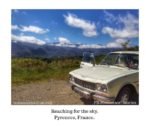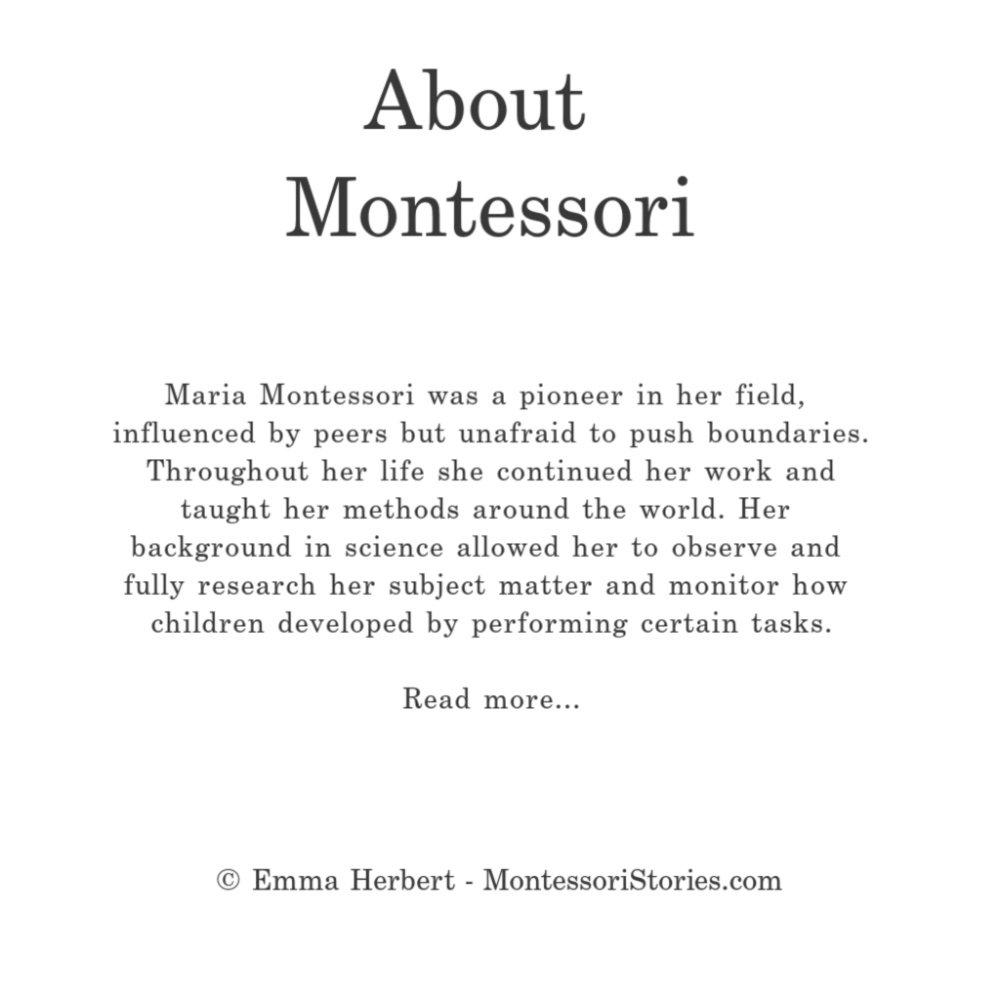
Introduction to Montessori ~ Whole Life Education
Montessori is something I researched while I was pregnant with my daughter, but initially I wasn’t aware of the complexity of the theories and observations of Maria Montessori. At that time, the appeal came from the idea of allowing a child to find their own way, giving them skills for life as well as time and space to learn and grow at their own pace. It is only now, ten years later, that I have studied the work of Dr Montessori, and I understand that the Montessori Method is much more than an approach to early years.
There is a belief that Montessori is about equipment, but actually the truth is far from this. Yes, typically you will see similar things in classrooms around the world but these are simply tools to aid the development of a whole person. I hope that by the time you finish reading this article you will start to understand more about the theories and benefits of Montessori education.
What are the Planes of Development in Montessori Education?
There are four planes of development which, contrary to popular belief, take our children beyond adolescence and into adulthood.
- First Plane of Development – 0 – 6 years – The Absorbent Mind
- Second Plane of Development – 6 – 12 years
- Third Plane of Development – 12 – 18 – Adolescence
- Fourth Plane of Development – 18 – 24 – Young Adult
Traditionally, people believe that at 18 our children are ready to step out alone. Maria Montessori knew that this was far from the truth, and her research and understanding of the human mind enabled her to see that the brain continues to grow, even when a young adult presents as visually fully grown.
She saw that there was a need for preparation of the adolescent to thrive in society, which is where the idea of Erdkinder began. The teenage years within a Montessori environment encompass academics, life skills and business; for me it seems logical to take this approach because even with the best qualifications in the world, if we don’t know how to feed ourselves and communicate how would we survive?
Maria Montessori ~ A Pioneering Force
Maria Montessori was a pioneer in her field, influenced by peers but unafraid to push boundaries. Throughout her life she continued her work and taught her methods around the world. Her background in science allowed her to observe and fully research her subject matter, and to monitor how children developed by performing certain tasks.
Her attention to detail and thoroughness enabled her to see how every child is different. She learned that by providing a range of opportunities for a child to follow their interest and giving them the time to be absorbed in an activity, the child was able to understand the work in a unique manner. By observing her students she knew when they were ready to be introduced to the next layer of complexity, and by listening to them she was able to provide the resources they needed.
To put it simply, every child is different.
The Montessori Classroom
In addition to her observations around the learning capabilities of young minds, Dr Montessori saw that children took joy from independence and responsibility. This is where the Montessori classroom comes into it’s own. The classroom should be set up in a way that allows the children ample opportunity to take ownership of their tasks. This doesn’t just mean a duty of care for the classroom materials, but also for the environment and self-care.
Space to move, a place for everything and an area for snacks and cleaning up are something you will see in various forms around the world. No classroom will be exactly the same, but it is a key trait that they will all enable a growing child’s needs to be met.
As the children shift through the planes of development, so the set up of the classroom changes. This not only considers their physical size, but also their need for more time with their peers as their social needs change.
The key element of every classroom though, is that the teacher is not obviously visible. You won’t find them at a desk at the front of the class, they will be quietly observing the children.
Cosmic Education
It’s a strange one, isn’t it? What does Cosmic Education in Montessori actually mean?
Whilst open to interpretation, we know that everything in the Universe is connected; we are made up of the same elements of animal and plant life, but with different ratios. It’s fair to say that the interconnectivity that flows throughout Montessori education – whether that’s teaching respect and courtesy, or the periodic table – aligns beautifully with the definition of Cosmic: ‘relating to the universe and the natural processes that happen in it’.
It makes perfect sense that the Five Great Lessons encapsulate this interconnectivity of all things, doesn’t it.
Montessori in 2024
It’s fair to say that in 2024 the Montessori classroom looks very different to the first school in Rome. So much has changed, and with palm-sized technology replacing writing slates it’s interesting to consider how Maria Montessori might have worked nowadays.
This topic is worth an entire article, so I won’t dwell here. However, there is one thing I’m certain of; Dr Montessori would likely have been the one spearheading research into how to benefit from scientific advances, and her observational skills would have placed her to see exactly how the internet and all of its applications impact the brain.
I’ll come back to this soon, so if you’d like to be notified when I do that you can join my newsletter.
This is probably a good point to close this introductory article. I hope it’s given you some insight, and I’d love to share more with you in the future. Please do stick around if, like me, you’re committed to learning and sharing more from Maria Montessori.
Maria Montessori was an inspirational woman, far ahead of her time. In this article we give you a brief overview of her life and an insight into her beliefs surrounding childhood and adolescence.
The Five Montessori Great Lessons are stories developed to inspire children to explore and learn. They provide the foundation for creative learning and for children to follow their interests and passions. Click through to read more about this, including how we intend to weave this into our own lives and this website.
Education of the Whole Child
Montessori education is becoming increasingly popular around the world both within schools and homeschooling circles. Let us share with you why we think Maria Montessori had it right.

